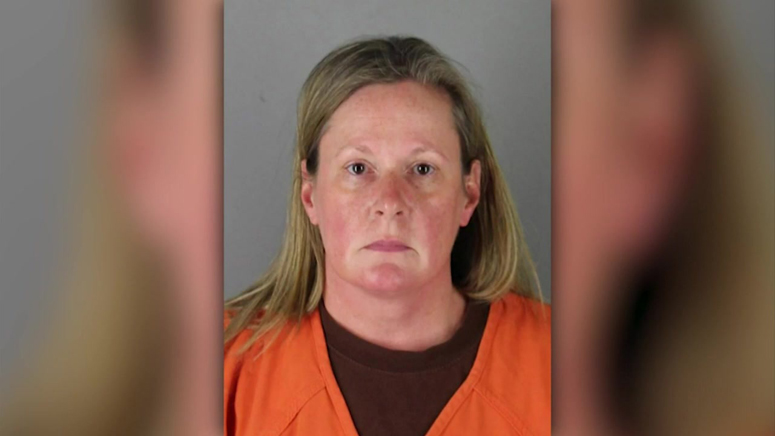MINNEAPOLIS (AP) — A prosecutor told jurors on Monday that the suburban Minneapolis police officer who says she meant to use her Taser instead of her gun when she shot and killed Black motorist Daunte Wright knew what she did was wrong and that she did not have “a license to kill.”
Prosecutor Erin Eldridge said during closing arguments in Kim Potter’s manslaughter trial that the former Brooklyn Center police officer was a “highly trained” and “highly experienced” 26-year veteran who acted recklessly.
“She drew a deadly weapon,” Eldridge told the court. “She aimed it. She pointed it at Daunte Wright’s chest, and she fired.”
Although there is a risk every time an officer makes traffic stop, that didn’t justify Potter using her gun on Wright after he pulled away from her and other officers during an April 11 traffic stop as they were trying to arrest him on an outstanding weapons possession warrant, Eldridge said.
“Carrying a badge and a gun is not a license to kill,” she said.
The mostly white jury will begin deliberating after Potter’s lawyers present their closing arguments.
Judge Regina Chu told jurors that she will not make them deliberate on Christmas Eve or Christmas Day. They’ll return after the holiday if they haven’t reached a verdict by then.
Playing Potter’s body camera video frame by frame, Eldridge sought to raise doubts about Potter’s testimony that she fired after seeing a look of fear on the face of another officer who was leaning into the car’s passenger-side door.
The defense rested Friday after Potter told jurors that she “didn’t want to hurt anybody,” saying during her sometimes tearful testimony that she shouted a warning about using her Taser on Wright after she saw fear in that other officer’s face.
Potter, 49, testified that she was “sorry it happened.” She said she didn’t remember what she said or everything that happened after the shooting, saying much of her memory of those moments “is missing.”
Potter, who resigned from the Brooklyn Center police force after the shooting, is charged with first-degree and second-degree manslaughter in the April 11 killing of Wright, who was pulled over in Brooklyn Center for having expired license plate tags and an air freshener hanging from his rearview mirror.
Potter, who was training another officer at the time, said she probably wouldn’t have pulled over the 20-year-old Wright’s car if she had been on her own that day. After that initial encounter, the traffic stop “just went chaotic,” she testified.
“I remember yelling, ‘Taser, Taser, Taser,’ and nothing happened, and then he told me I shot him,” Potter, who is white, said through tears. Her body camera recorded Wright saying, “Ah, he shot me,” after the shooting.
Potter’s attorneys argued that she made a mistake but also would have been justified in using deadly force if she had meant to because they say one of the other officers was at risk of being dragged by Wright’s car.
During cross-examination, Eldridge noted that Potter told a defense expert that she didn’t know why she drew her Taser. Quoting from the expert’s report, Eldridge said Potter told him: “I don’t have an answer, my brain said grab the Taser.” Potter testified she didn’t recall saying that.
Prosecutors have argued that Potter had extensive training about Taser use and in use of deadly force, including warnings about confusing the two weapons. Eldridge got Potter to agree that her use-of-force training was a “key component” of being an officer. Potter testified that she was trained on when to use force and how much to use, and that there was a department policy that dictated what officers could or could not do.
Wright’s death set off angry demonstrations for several days in Brooklyn Center. It happened as another white officer, Derek Chauvin, was standing trial in nearby Minneapolis for the killing of George Floyd.
State sentencing guidelines call for just over seven years in prison upon conviction of first-degree manslaughter and four years for second-degree, though prosecutors have said they plan to push for longer sentences.
Chu told jurors that intent is not part of the charges against Potter and that the state doesn’t have to prove she tried to kill Wright.
The judge said to prove first-degree manslaughter, prosecutors have to prove that Potter caused Wright’s death while committing the crime of reckless handling of a firearm. This means they must prove that she committed a conscious or intentional act while handling or using a firearm that creates a substantial or unjustifiable risk that she was aware of and disregarded, and that she endangered safety.
For second-degree manslaughter, the state must prove that she acted with culpable negligence, meaning she consciously took a chance of causing death or great bodily harm.
(Copyright (c) 2024 The Associated Press. All Rights Reserved. This material may not be published, broadcast, rewritten, or redistributed.)

